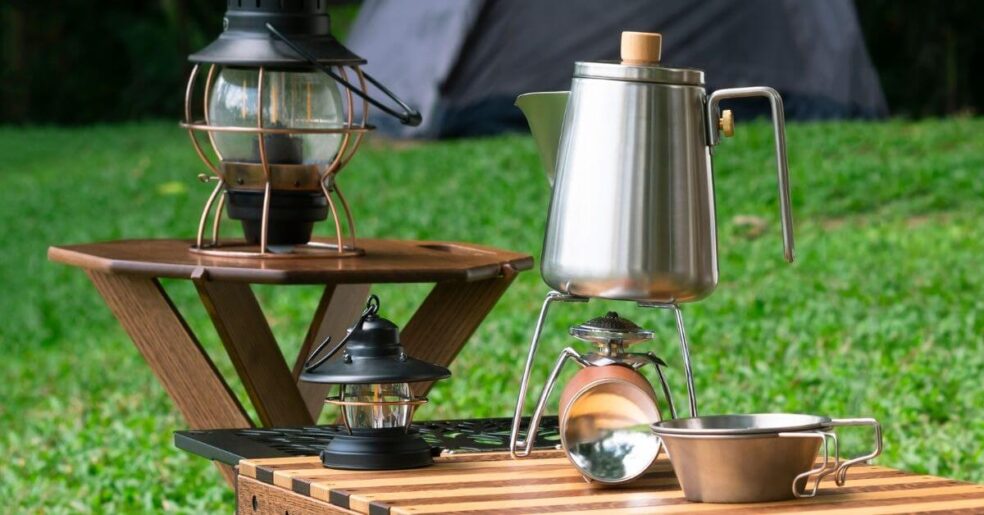As the owner of a French Press, you’re used to heating your water separately before adding it to the brewer. But to make things more convenient, you may be wondering if you can use a French Press on the stovetop to heat the water directly.
In general, you should not use a French Press on the stovetop. Although French Presses are commonly made from heat-resistant materials like borosilicate glass, they are not built to tolerate direct heat from a stove and can crack and break due to thermal shock.
So, the French Press you already own most likely isn’t stovetop safe.
However, there are metal French Presses such as the Stanley Adventure French Press that are specifically made to be placed on campfires. These coffee makers will do just fine on the stove.
French Press Stovetop: Top Picks!
- Stanley Adventure French Press
- Bestargot Camping Titanium French Press
- Lixada Titanium French Press
- Boundless Voyage French Press
Can You Use A French Press On The Stovetop?
You generally shouldn’t put a French Press on the stovetop since the majority of these brewers are not made to withstand direct heat.
When placed on the stove, your French Press will become much hotter when it’s in direct contact with the heating element. And it will stay relatively cooler where it’s furthest away from the heat source.
Since hotter material expands more, the temperature difference will put stress on your French Press and may even cause it to break.
However, French Presses are made of different materials, such as
- plastic
- glass
- ceramic
- stainless steel and
- titanium
And each of these materials can withstand different temperatures before they are damaged.
(Obviously, plastic doesn’t belong anywhere near a stovetop, so we’ll leave that one out of the discussion.)
So, too much heat can break a French Press, but can any of these materials tolerate just enough heat to boil your water without breaking your French Press? Let’s quickly discuss each of them and find out.
Related Posts:
French Press Stovetop: Top Picks!
| Brand | Size | Material | Image |
| Stanley Adventure French Press | 32 oz | Stainless steel |  |
| Bestargot Camping Titanium French Press | 25.3 oz | Pure titanium |  |
| Lixada Titanium French Press | 25.3 oz | Titanium |  |
| Boundless Voyage French Press | 25.3 oz | Titanium |  |
Can You Put A Glass French Press On The Stove?
Do not put your glass French Press on the stove. Most French Presses are made out of borosilicate glass, which is specifically made to be heat resistant. However, this glass cannot withstand the high temperatures generated by a stove.
Borosilicate glass is can withstand temperatures up to 330°F.
However, the heating element on your stove can reach temperatures much higher than this!
Even if you don’t leave your French Press on the stove for long or turn the heat up too high, repeated exposure to direct heat can weaken and eventually break the glass.
So, don’t put your glass French Press on the stovetop, even if it is “heat-resistant”
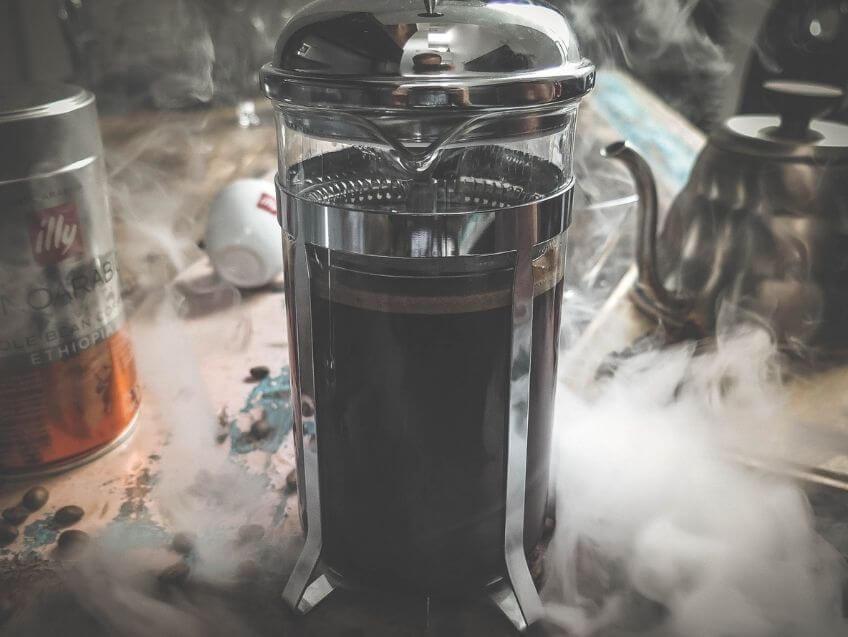
Related Posts:
- Can I Use a French Press With Pre-Ground Coffee? Pros And Cons
- Should You Stir Coffee In A Frenc Press?
- Why Is My French Press Hard To Press? (Top 5 Reasons)
Can You Put A Ceramic French Press On The Stove?
Ceramic French Presses should not be placed on direct heat either, even though they are more resistant to thermal shock than French Presses made of borosilicate glass.
Le Creuset is a brand that makes ceramic French Presses, and they say their stoneware products are microwave safe and can tolerate temperatures up to 500°F.
However, they also say their ceramic French Press is not safe for the stovetop.
So, while a ceramic French Press has certain advantages (they’re more durable and keep coffee warm longer), being able to use it on the stove isn’t one of them.
If you’re interested in ceramic French Presses, you can check out Le Creuse on Amazon.
Can You Put A Stainless Steel Press On The Stove?
There are two types of stainless steel French Presses:
- double-walled and
- single-walled
You generally should not place a double-walled French Press on the stove. However, single-walled stainless steel French Presses should be safe for the stovetop.
First, let’s talk about the double-walled version.
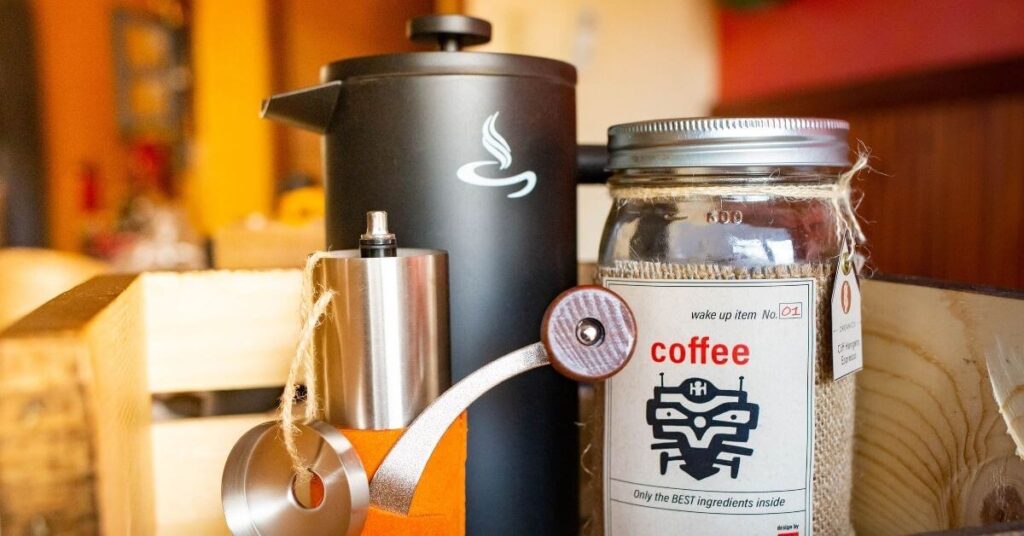
Related Posts:
- French Press: Dark Roast vs Light Roast ( Which Is Superior ?)
- My French Press Coffee Is Bitter: How To Brew A Less Bitter Cup!
- Why Is Sludge On My French Press Coffee ( And How To Fix It!)
Heating A Double-Walled Stainless Steel French Press
A double-walled French Press has an outer wall and inner wall that are separated by a thin vacuum. This provides insulation and keeps the coffee from losing heat.
But that insulation will also keep the coffee from gaining heat.
If you put a double-walled French Press on the stove the heat will raise the temperature of the outer wall, but the insulation will prevent the water from being heated.
So, while this French Press may not be damaged by the stove, it’s not a good option for boiling water.
French Press Stovetop: Top Picks!
| Brand | Size | Material | Image |
| Stanley Adventure French Press | 32 oz | Stainless steel |  |
| Bestargot Camping Titanium French Press | 25.3 oz | Pure titanium |  |
| Lixada Titanium French Press | 25.3 oz | Titanium |  |
| Boundless Voyage French Press | 25.3 oz | Titanium |  |
Heating A Single-Walled Stainless Steel French Press
With the single-walled French Press, there’s no insulation preventing the water from being heated, so this may be a good option for heating water on the stovetop.
However, keep in mind that the French Press manufacturers don’t intend for it to be placed on direct heat.
So, even though the steel portion of the brewer may not be damaged, the handle or any other attached pieces may not be so lucky.
This is why we recommend using a French Press that’s specifically made to be placed on direct heat such as those made for camping.
Can You Put Titanium French Presses On The Stove?
Titanium French Presses are usually made for outdoor use, but they can also be used indoors. They’re strong, durable, and safe to put on the stove.
Most of the Titanium French Presses I’ve found are single-walled as well, so they have no problem boiling water over direct heat either.
So, what’s the difference between stainless steel and titanium French Presses? Honestly, there’s not much.
Stainless steel is an alloy while titanium is pure metal. And titanium is stronger than steel. But other than that, they’ll brew your coffee the same.
Related Posts:
- Can You Leave Coffee In A French Press And What Happens If You Do
- Why Do French Press Explode (And How To Prevent It)
- Moka pot vs French Press: Whose Coffee Is Best?
Use A Camping French Press On The Stove
Generally, you shouldn’t put a French Press on the stove.
However, if it’s stainless steel or titanium and was made specifically for brewing coffee over campfires, you should have no issues using it on the stovetop.

French Press Stovetop: Top Picks!
- Stanley Adventure French Press
- Bestargot Camping Titanium French Press
- Lixada Titanium French Press
- Boundless Voyage French Press
The Stanley Adventure French Press
If you prefer a stainless steel French Press, we’d recommend the Stanley Adventure All-In-One Boil And Brewer. (You can find the Stanley Adventure French Press on Amazon.)
It’s made for outdoor use, but many people use it in their homes. It’s also single-walled stainless steel with a steel handle, so you don’t have to worry about heat damage.
This French Press comes with a unique plastic plunger that some people like and others don’t.
But you can always grab a more traditional plunger from a different French Press and use it to press the coffee in your Stanley Adventure.
Related Posts:
Bestargot Camping Titanium French Press
If you’d rather have a titanium French Press, then you can go with Bestargot. (The Bestargot French Press is also available on Amazon.)
It’s strong, light, and durable. Also, the plunger is the traditional metal plunger you’d expect to find in a French Press.
The Material Will Affect Your Coffee Experience
Finding a French Press you can use on the stove will make it more convenient to brew coffee.
But one final thing to keep in mind is that the material your French Press is made of will affect your coffee experience.

Pros and Cons of The Glass French Press
Glass, while the easiest to break due to thermal shock, is seen as the more traditional option. Many people also perceive it as the best material because it doesn’t alter the coffee’s flavor.
However, glass doesn’t retain heat like ceramic or steel, so your coffee will cool off fairly rapidly.
Pros And Cons Of The Ceramic French Press
Ceramic French Presses retain more heat than glass, so they’ll keep your coffee warmer for a longer time. They’re also more durable than glass, but they can still break.
These coffee brewers are harder to find and more expensive, but they come in a variety of colors that can add some personality to your kitchen.
Lastly, ceramic is pretty heavy. So, you may be surprised when you pick up your heavy coffee maker and realize it’s holding a lot less coffee than you thought.
Related Posts:
- Best Blender For Bulletproof Coffee: The Most Complete Review 2022!
- Turkish Coffee Grinder: How to Choose The Best!
Pros And Cons Of The Stainless Steel And Titanium French Presses
For starters, metal French Presses are the only ones that can survive on the stovetop.
They also have an industrial look that many people like, they retain heat well, and are much more durable than either glass or ceramic French Presses.
However, some people perceive that stainless steel and titanium alter the flavor of the coffee. Others point out that these are stable and inert materials so they technically won’t interact with any compounds in the coffee.
As you can see, there are quite a few pros and cons to each type. But in the end, you should go with whatever brewer gives you the results you want.
French Press Stovetop: Top Picks!
- Stanley Adventure French Press
- Bestargot Camping Titanium French Press
- Lixada Titanium French Press
- Boundless Voyage French Press
Key Takeaways
You shouldn’t put a French Press on the stovetop unless you’re using a single-walled stainless steel or titanium brewer made for direct heat.
- Glass French Presses can easily crack due to thermal stress
- Ceramic French Presses are more durable but can crack on the stovetop as well
- Double-walled stainless steel French Presses are insulated so your water won’t heat up
- Single-walled stainless steel and titanium French Presses won’t break and will allow heat to reach the water
Cheers Coffee Lovers!

KEEP READING
- Is Arabica Or Robusta Best For Cold Brew Coffee?

- Why Is My Espresso Puck Wet? (The 6 Most Common Reasons)

- How To Make Cuban Coffee Without A Moka Pot? (3 Options!)
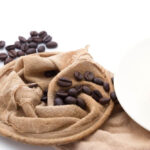
- Does Cold Brew Break A Fast? Things To Consider!

- Can I Use Coffee Grounds Twice? (Here Are Our Results!)

- What’s The Best Grind Size For A Moka Pot? Ultimate Guide!
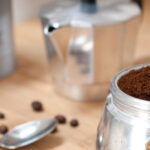
- Does Espresso Have Milk? A Simple (But Complete) Guide

- Can I Use A French Press With Pre-Ground Coffee? Pros And Cons
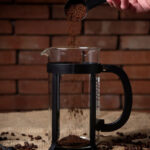
- How Much Caffeine Is In Two Shots Of Espresso?

- Can You Brew Coffee With Milk? (4 Methods That Will Work!)

- Can You Make Cold Brew Coffee With Milk Instead Of Water?

- Can You Use Milk In A Moka Pot? (Here Are Our Results!)


Oliver is co-owner of Coffee Break Lovers. The only thing he loves more than the process of brewing coffee is drinking it.

